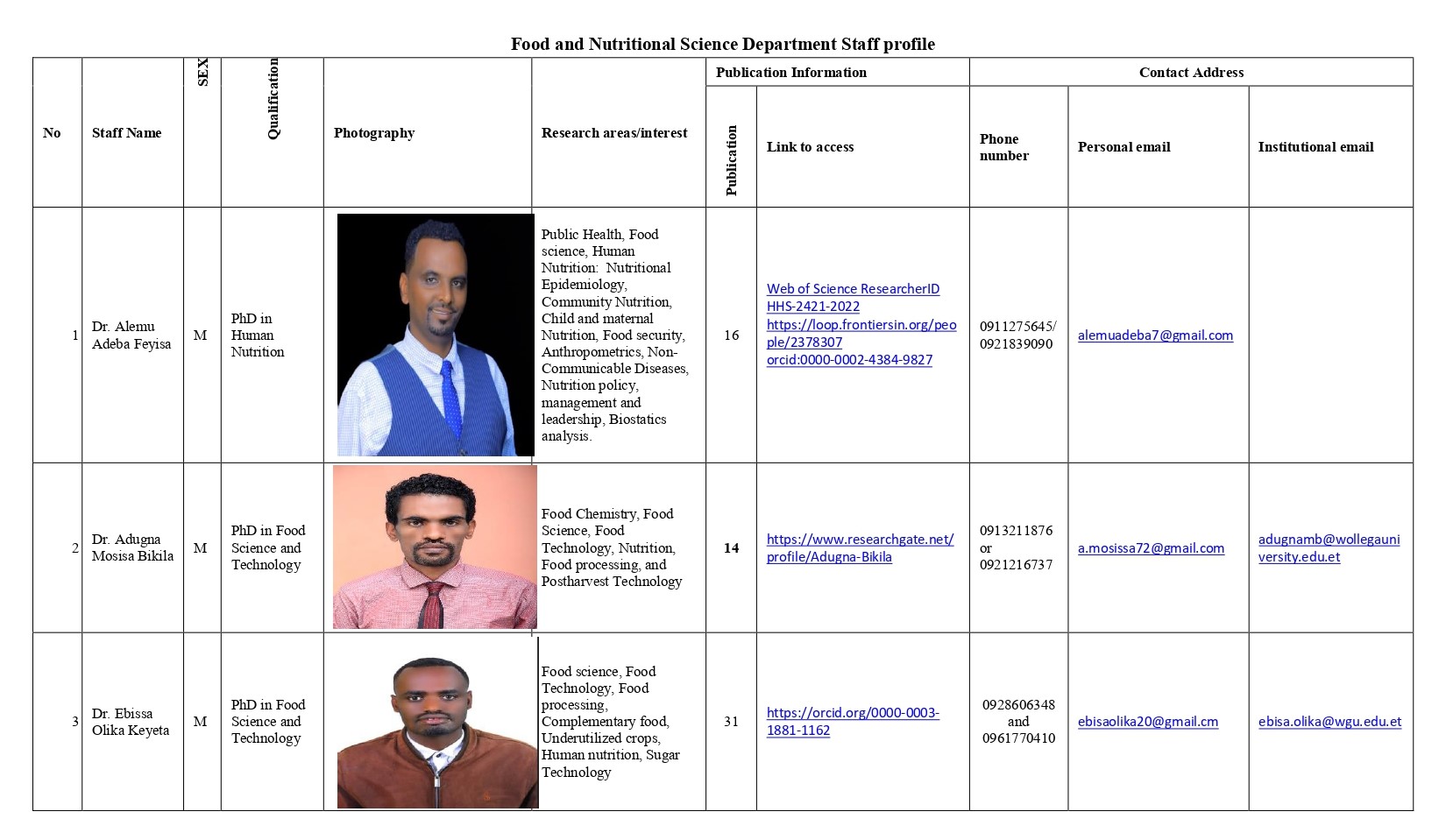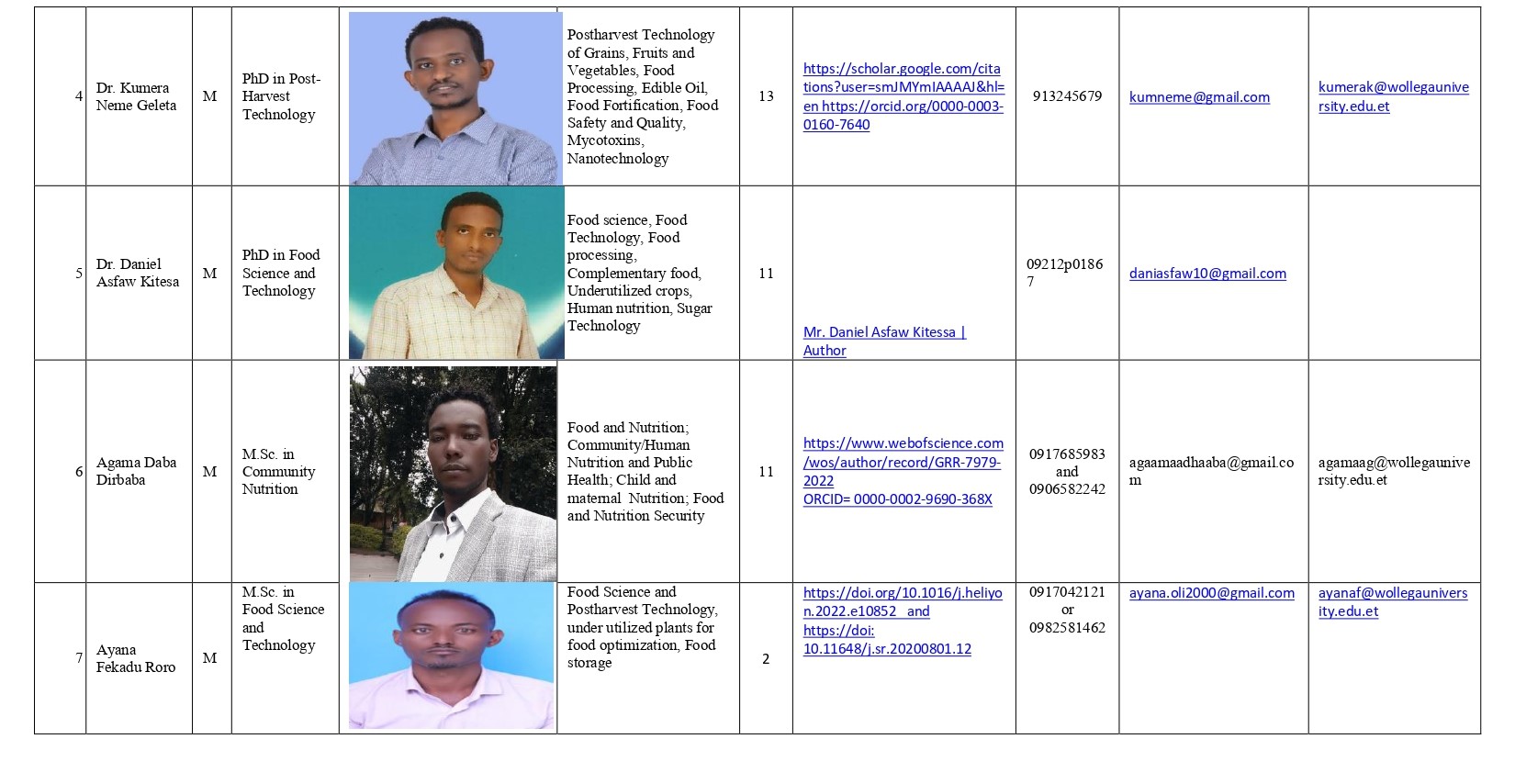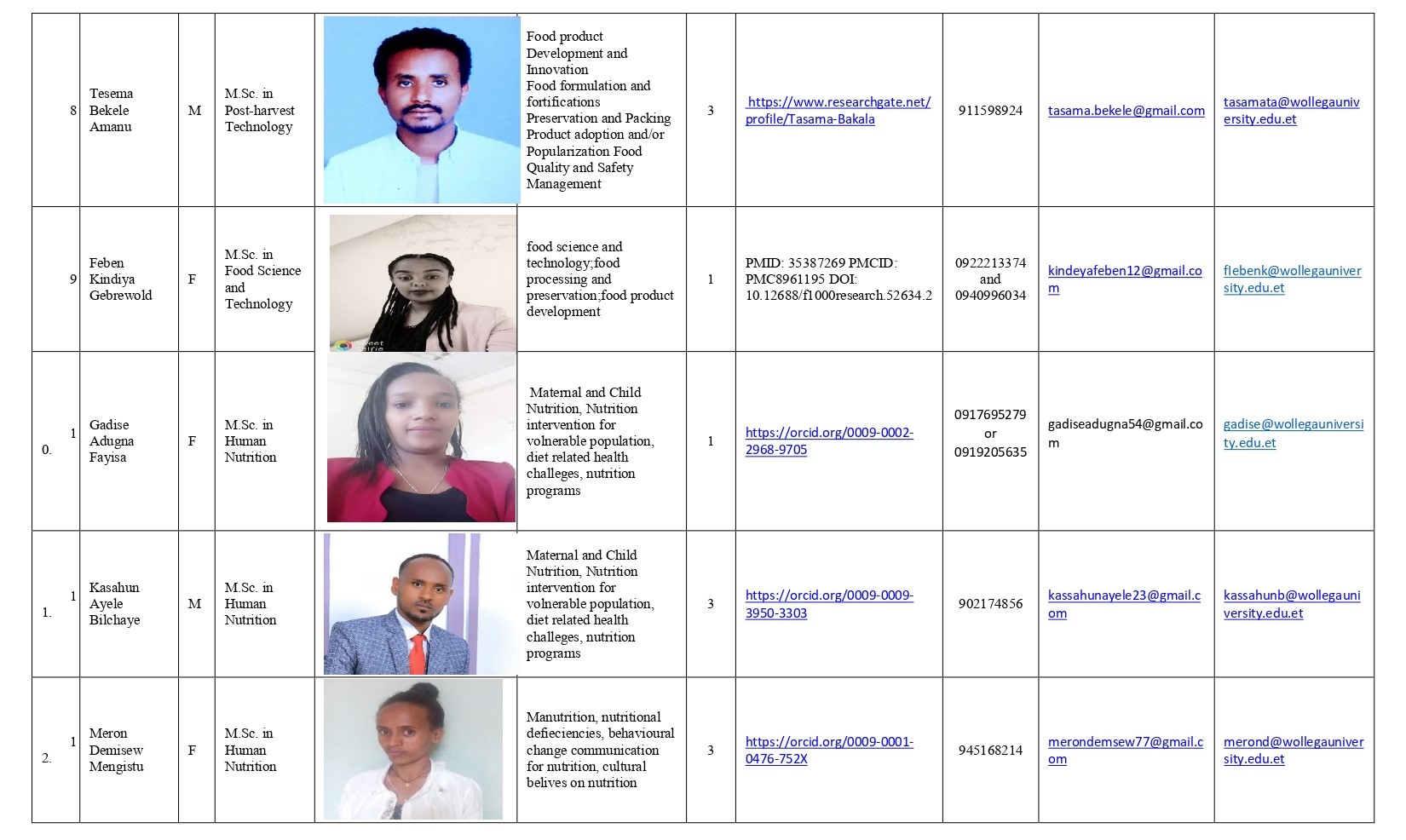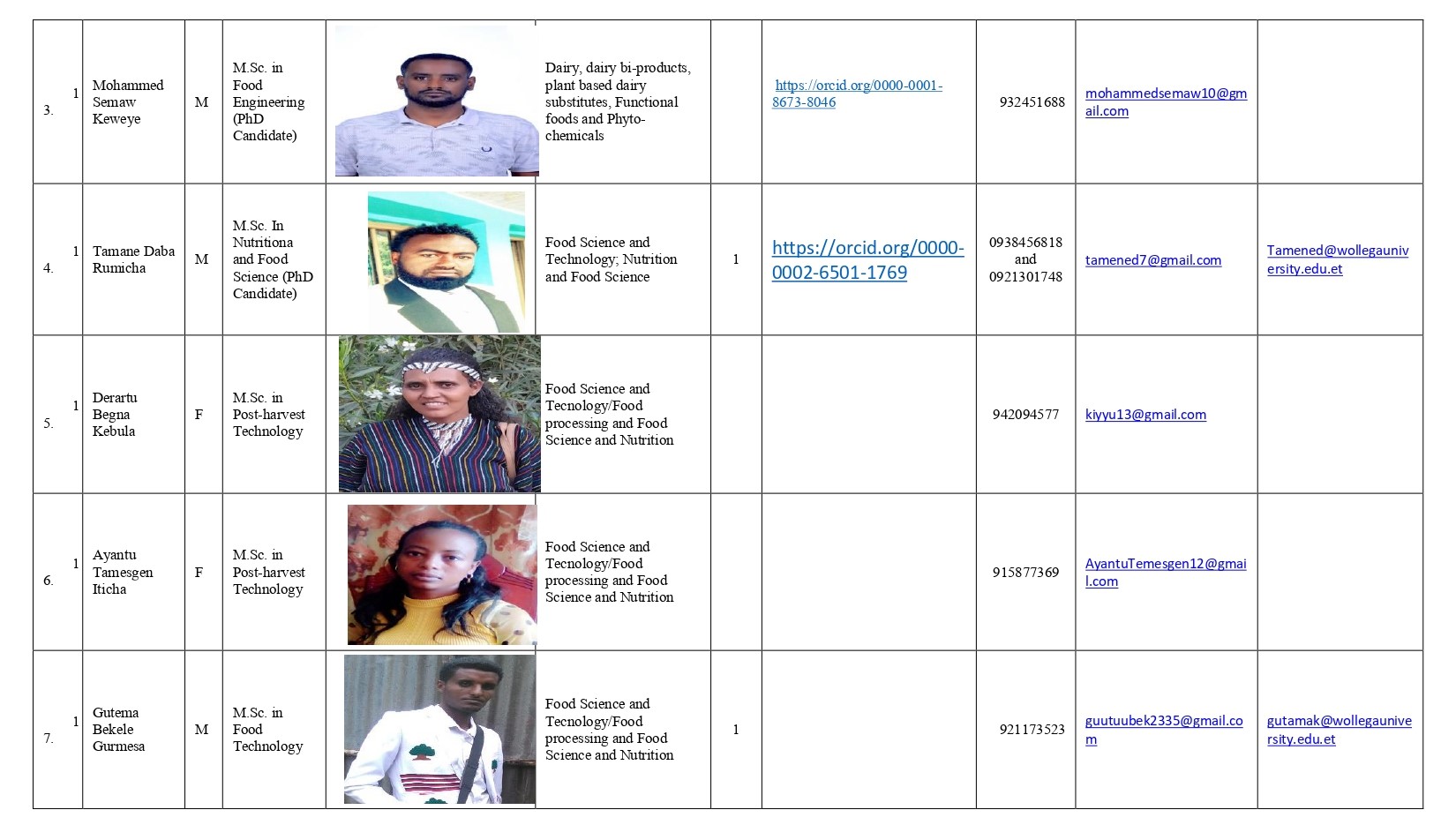Background information
The Department of Horticulture at Wallaga University is housed within the Faculty of Agriculture at the Shambu Campus, located in the Oromia Region of Ethiopia. Established in 2008 E.C. (Ethiopian Calendar), it is one of the newer departments at the university, yet it has rapidly developed to play a significant role in agricultural education and research. The program is committed to equipping students with both theoretical knowledge and practical skills to meet the growing demands of the Horticulture industry. Currently, the department offers comprehensive academic programs at both undergraduate and postgraduate levels.
Program Overview
The Horticulture program is meticulously designed to provide students with a strong foundation in the science and practice of Horticultural crop Production, Management, Processing, Post-harvest handling, and Marketing. The curriculum combines theoretical instruction with hands-on learning, enabling students to develop problem-solving skills applicable to real-world challenges in the crop production sector. The program emphasizes modern techniques and sustainable practices to enhance productivity, quality, and profitability in horticultural enterprises. Students are exposed to a variety of crops, including fruits, vegetables, ornamental plants, and medicinal plants, preparing them to contribute effectively to both local and global agricultural systems
Vision:
To establish the department as a leading center of excellence in Horticulture, propelling the Campus to the forefront of agricultural innovation in Ethiopia and earning global recognition for excellence in research, education, and sustainable practices.
Mission:
To train highly skilled, practical, and responsive professionals in Horticulture through quality education, integrated research, and impactful extension services, with a strong focus on innovation and real-world problem solving.
Degree Levels Offered
Bachelor of Science (B.Sc. Degree in Horticulture): A four-year undergraduate program that provides in-depth knowledge and practical skills in: Horticultural crop production and management, Plant propagation techniques, Soil and water management in Horticulture, Pest and disease management, Crop processing and value addition, Post-harvest handling and storage technologies and Marketing and agribusiness strategies in Horticulture. Graduates of this program are equipped to work as professional horticulturists, agricultural extension agents, agribusiness entrepreneurs, and researchers.
Master of Science (M.Sc.) Degree in Horticulture
The graduate program offers advanced studies and research opportunities in specialized areas of Horticulture. Areas of focus include: Advanced crop production systems, Horticultural crop improvement, Integrated pest and disease management, Post-harvest technology and quality control, Horticultural marketing and value chain development. The M.Sc. program is designed to prepare graduates for leadership roles in research institutions, universities, governmental and non-governmental organizations, and the private sector.
Specializations and Focus Areas
The Horticulture program is a diverse and dynamic field that encompasses several specialized branches. Each branch focuses on specific aspects of plant cultivation, production, and utilization. The major areas of specialization within horticulture include:
§ Pomology: is the branch of horticulture concerned with the study, cultivation, and management of fruit-bearing trees. It involves the scientific and practical aspects of growing, harvesting, storing, processing, and marketing tree fruits such as apples, pears, peaches, cherries, and citrus fruits. The primary objective of pomology is to improve the quality and yield of fruit crops while ensuring sustainable production practices.
§ Olericulture: focuses on the production and management of vegetables. This branch includes all stages of vegetable cultivation from seed selection and propagation to harvesting, storage, processing, and marketing. Crops in this category include tomatoes, onions, carrots, cucumbers, and leafy greens. Olericulture emphasizes maximizing crop yield, maintaining quality, and ensuring food safety.
§ Floriculture: deals with the cultivation and management of flowering and ornamental plants. This branch encompasses the production of cut flowers, potted plants, bedding plants, and foliage plants. Floriculture also includes post-harvest handling, floral design, storage, and marketing of flowers. It plays a crucial role in the aesthetic enhancement of spaces and is closely linked to the floral industry and landscape design.
§ Ornamental Horticulture and Landscape Design: This specialization involves the cultivation and maintenance of ornamental plants, including grasses, annuals, perennials, shrubs, and trees used for beautifying landscapes. It also includes the planning and design of gardens, parks, urban green spaces, and recreational areas. The focus is on creating functional and visually appealing outdoor environments while considering ecological sustainability and horticultural best practices.
§ Plantation Crops: Plantation horticulture is dedicated to the cultivation of commercial crops on a large scale, often over extensive, contiguous areas. These crops, such as tea, coffee, rubber, coconut, and oil palm, are typically grown in plantations owned and managed by individuals, companies, or cooperatives. The produce from these crops usually requires processing before consumption or sale, making value addition a key aspect of this specialization.
§ Spices and Condiments: This branch focuses on the cultivation of spice and condiment crops used primarily for flavoring, seasoning, and preserving food. Examples include black pepper, cardamom, turmeric, ginger, cumin, and chili. The cultivation of these crops requires specific agro- climatic conditions and precise post-harvest processing to preserve their quality and potency.
§ Arboriculture: is the science and art of cultivating and managing individual trees, shrubs, and other perennial woody plants. It primarily focuses on plants used for shade, ornamentation, or avenue planting in urban and suburban landscapes. Arboriculture involves tree planting, pruning, disease management, and overall tree care to ensure healthy, structurally sound, and aesthetically pleasing plants.
Curriculum Structure
The undergraduate program typically includes courses such as:
- Principles and Practices of Plant Propagation.
- Principles and Practices of Protected Horticulture
- Horticultural Seed Science and Technology
- Principles, Design and Analysis of Agricultural Experiments
- Vegetable Crops Production and Management
- Ornamental Plants Production and Management
- Tropical Fruit Crops Production and Management
- Research Methods in Horticulture
- Root and Tuber Crops Production and Management
- Coffee Production, Processing and Quality Control
- Sub-tropical and Temperate Fruit Crops Production and Management
- Post-harvest Physiology and Handling of Horticultural Products
- Spices, Herbs and Medicinal Plants Production and Processing
- Tea Production and Processing
- Practical attachment
Research and Facilities
Wallaga University supports research in Horticulture through facilities such as:
- Greenhouse and Lath-house: Production system allow researchers to control variables like temperature, humidity, light, and CO₂ levels to study plant responses.
- Laboratories: Provide controlled environments for conducting experiments, testing hypotheses, and developing new technologies or products.
Field Demonstration Sites: Play a crucial role in agricultural research, extension, and training. These sites serve as practical platforms where new technologies, crop varieties, and farming practices are tested, displayed, and taught to farmers, students, researchers, and extension workers.
Career Opportunities
Graduates of the Horticulture program can pursue careers in:
- Horticulture Officer
- Agricultural Officer
- Assistant Director of Horticulture
- Floriculture Inspector
- Work in Agricultural Research institutes.
- Involves working on crop improvement, pest control, and plant breeding.
- After a graduation can become a Lecturer in universities or agricultural colleges.
- Roles in plantation management, afforestation projects, and environmental conservation.
- Roles in sales, marketing, and technical advisory for companies selling: Seeds, Fertilizers, Pesticides, Greenhouse equipment
- Work with companies involved in processing fruits, vegetables, and herbs.
- Roles in quality control, product development, and packaging
- Jobs in plant nurseries, garden centers, and landscape design companies.
- Positions like horticulture consultant, landscape designer, or garden manager
- Management of climate-controlled farming systems.
- Opportunities in protected cultivation, hydroponics, or vertical farming startups
- Export-import businesses of flowers, fruits, and ornamental plants.
- Horticulture students with business sense can start their own ventures: Plant nurseries, Floriculture farms, Organic farms, Herbal and medicinal plant cultivation, Fruit/vegetable processing units and Landscape architecture business
- Government Agriculture Departments
The program equips students with the skills needed to contribute effectively to the national and international agricultural sector.
 Biratu Abeshu Erandufa (M.Sc. in Horticulture) is a dedicated member of the Horticulture Department and currently serves as the Head of the Department.
Biratu Abeshu Erandufa (M.Sc. in Horticulture) is a dedicated member of the Horticulture Department and currently serves as the Head of the Department.





 gama Daba Dirbaba (M.Sc. in Community Nutrition) is one of Food and Nutritional Science department staff and currently Head of the department.
gama Daba Dirbaba (M.Sc. in Community Nutrition) is one of Food and Nutritional Science department staff and currently Head of the department.